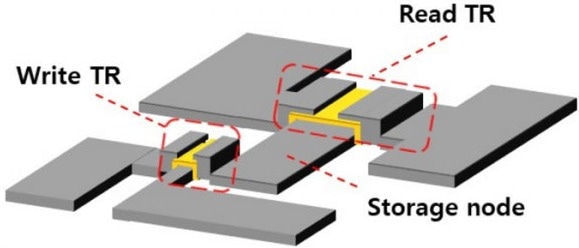ChatGPT's impact extends beyond the education sector and is causing significant changes in other areas. The artificial intelligence (AI) language model is recognized for its ability to perform various tasks, including paper writing, translation, coding, and more, all through question-and-answer-based interactions. The AI system relies on deep learning, which requires extensive training to minimize errors, resulting in frequent data transfers between memory and processors.
 Structure of the proposed AI synaptic device. Two oxide semiconductor transistors are connected; one for writing and the other for reading. Image Credit: POSTECH
Structure of the proposed AI synaptic device. Two oxide semiconductor transistors are connected; one for writing and the other for reading. Image Credit: POSTECH
However, traditional digital computer systems' von Neumann architecture separates the storage and computation of information, resulting in increased power consumption and significant delays in AI computations. Researchers have developed semiconductor technologies suitable for AI applications to address this challenge.
A research team at POSTECH, led by Professor Yoonyoung Chung (Department of Electrical Engineering, Department of Semiconductor Engineering), Professor Seyoung Kim (Department of Materials Science and Engineering, Department of Semiconductor Engineering), and Ph.D. candidate Seongmin Park (Department of Electrical Engineering), has developed a high-performance AI semiconductor device using indium gallium zinc oxide (IGZO), an oxide semiconductor widely used in OLED displays. The new device has proven to be excellent in terms of performance and power efficiency.
The research was published in Advanced Electronic Materials ("Highly Linear and Symmetric Analog Neuromorphic Synapse Based on Metal Oxide Semiconductor Transistors with Self-Assembled Monolayer for High-Precision Neural Network Computation").
Efficient AI operations, such as those of ChatGPT, require computations to occur within the memory responsible for storing information. Unfortunately, previous AI semiconductor technologies were limited in meeting all the requirements, such as linear and symmetric programming and uniformity, to improve AI accuracy.
The research team sought IGZO as a key material for AI computations that could be mass-produced and provide uniformity, durability, and computing accuracy. This compound comprises four atoms in a fixed ratio of indium, gallium, zinc, and oxygen and has excellent electron mobility and leakage current properties, which have made it a backplane of the OLED display.
Using this material, the researchers developed a novel synapse device composed of two transistors interconnected through a storage node. The precise control of this node's charging and discharging speed has enabled the AI semiconductor to meet the diverse performance metrics required for high-level performance.
Furthermore, applying neuromorphic synaptic devices to a large-scale AI system requires the output current of synaptic devices to be minimized. The researchers confirmed the possibility of utilizing the ultra-thin film insulators inside the transistors to control the current, making them suitable for large-scale AI.
The researchers used the newly developed synaptic device to train and classify handwritten data, achieving a high accuracy of over 98%, which verifies its potential application in high-accuracy AI systems in the future.
Professor Chung explained, "The significance of my research team's achievement is that we overcame the limitations of conventional AI semiconductor technologies that focused solely on material development. To do this, we utilized materials already in mass production. Furthermore, Linear and symmetrical programming characteristics were obtained through a new structure using two transistors as one synaptic device. Thus, our successful development and application of this new AI semiconductor technology show great potential to improve the efficiency and accuracy of AI."